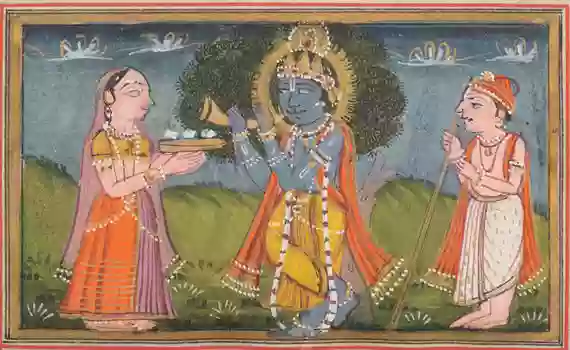Table of contents [Show]
1. Introduction: The Advent of Krishna
Krishna is one of the most revered deities in Hinduism, embodying a complex and multifaceted divine presence. Widely celebrated across India and beyond, Krishna's stories and teachings are central to Hindu religious practice and cultural life. This article delves into the many dimensions of Krishna, exploring his role in Hinduism, his historical and theological significance, and the enduring impact of his teachings.
Historical and Theological Background
Krishna’s Origins and Mythological Roots
Krishna's origins are deeply embedded in ancient Hindu texts and traditions. He is traditionally considered the eighth avatar (incarnation) of Vishnu, one of the principal deities in Hinduism. The most detailed accounts of Krishna's life and deeds are found in the Mahabharata, particularly in the Bhagavad Gita, and the Bhagavata Purana.
Krishna's story is set against the backdrop of ancient Indian kingdoms and is often portrayed in a variety of forms—ranging from a mischievous child to a heroic prince. His life is said to be a blend of divine play (lila) and profound teachings.
Krishna in the Bhagavad Gita
One of the most important texts in Hindu philosophy, the Bhagavad Gita is a 700-verse epic that takes the form of a dialogue between Krishna and the prince Arjuna. This text addresses the moral and philosophical dilemmas faced by Arjuna on the battlefield of Kurukshetra. Krishna imparts spiritual wisdom and guidance on duty, righteousness, and devotion, making the Bhagavad Gita a cornerstone of Hindu thought.
Krishna’s Major Incarnations and Legends
The Childhood Mischief and Divine Acts
Krishna’s early life is marked by numerous legends, including his miraculous birth and childhood exploits. Known for his divine mischief, Krishna is famous for his playful stealing of butter, his miracles, and his role as a protector of the people of Vrindavan. These stories are celebrated during festivals like Janmashtami, which marks his birth.
The Heroic Prince
As he grows up, Krishna plays a crucial role in the Mahabharata. His strategic brilliance and moral guidance are instrumental in the success of the Pandavas in the Kurukshetra War. Krishna's role as a charioteer and advisor to Arjuna highlights his divine wisdom and his commitment to righteousness.
Krishna’s Philosophical and Cultural Influence
Teachings of Krishna
Krishna's teachings, particularly those found in the Bhagavad Gita, emphasize the importance of living a life of righteousness, devotion, and duty. He advocates for a path of devotion (bhakti) and emphasizes the concept of selfless action. His teachings have influenced not only Hindu philosophy but also various other spiritual traditions.
Krishna in Art and Culture
Krishna's influence extends beyond religious texts into art, music, dance, and literature. His depictions in classical Indian art, such as the famous paintings of him playing the flute, are celebrated for their aesthetic beauty and spiritual depth. The stories of Krishna continue to inspire various forms of artistic expression across the world.
Modern-Day Reverence and Practices
Festivals and Worship
Krishna is venerated through various festivals and practices. Janmashtami, Holi, and Radhashtami are major festivals that celebrate different aspects of Krishna’s life and his divine play. Devotees participate in elaborate rituals, prayers, and cultural performances to honor Krishna.
Global Impact
The teachings of Krishna have also reached a global audience through movements like the International Society for Krishna Consciousness (ISKCON). This organization, also known as the Hare Krishna movement, promotes Krishna's teachings and practices worldwide.
Featured FAQs
What is Krishna’s role in Hinduism?
Krishna is considered the eighth avatar of Vishnu and a central figure in Hinduism. His role encompasses various aspects, from divine play and heroic deeds to spiritual teachings. His guidance in the Bhagavad Gita is a key element of Hindu philosophy.
What are the main texts about Krishna?
The primary texts detailing Krishna’s life and teachings are the Mahabharata (especially the Bhagavad Gita) and the Bhagavata Purana. These texts provide comprehensive accounts of his divine acts and philosophical teachings.
How is Krishna celebrated?
Krishna is celebrated through several major festivals, including Janmashtami (his birthday), Holi (the festival of colors), and Radhashtami (celebrating his consort Radha). These festivals involve rituals, prayers, and cultural performances.
What is the significance of the Bhagavad Gita?
The Bhagavad Gita is a key philosophical and spiritual text that records a conversation between Krishna and the prince Arjuna. It addresses profound questions about duty, righteousness, and the nature of reality, making it a crucial work in Hindu philosophy.
Reputable Sources
- Britannica on Krishna(no-follow)
- Hinduism Today: Krishna(no-follow)
- ISKCON Official Website(no-follow)
Conclusion
Krishna remains one of the most influential and beloved figures in Hinduism. His life and teachings continue to inspire millions, shaping both spiritual practice and cultural expression. By understanding the depth and breadth of Krishna’s impact, one gains a richer appreciation of Hindu philosophy and its global significance.




